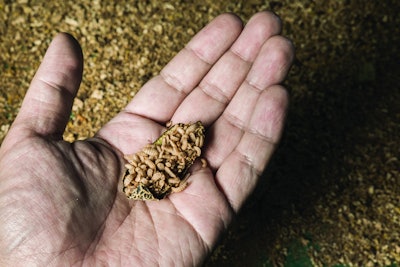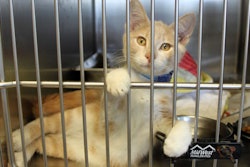
Singapore-based Protenga, a biotechnology company specializing in insect cultivation for pet food and animal feed, recently announced that it had secured investments from three additional sources – the Yield Lab Asia-Pacific, SEEDS Capital and JBI Innovations – in its latest funding round. No amount for the round was disclosed, but the investments will drive the company’s second-generation Smart Insect Farm and expand its partnerships with the palm industry in Malaysia and Indonesia for their organic waste.
Protenga expects to introduce the next phase of its Smart Insect Farm in 2023. The Smart Insect Farm is designed to recapture nutrients from organic waste as insect feed to convert into protein for use in pet food and animal feed. The sustainability minded company uses black soldier fly larvae (BSFL) as the insect protein; it is not a pest or a vector, has a versatile diet and is nutritious as a food source for pets and livestock, according to Protenga.
Insect protein producer moving from niche to mainstream
“Black soldier fly is naturally palatable when it is processed right,” said Protenga Founder and CEO Leo Wein. “So you can have the most nutritious and healthy protein, but if it does not contribute to the palatability of the product, then it does not help much. BSFL has a very balanced nutrition profile, amino acid profile, fatty acid profile.”
He said that in the growing insect protein market, Protenga hopes to move from a niche product into a mainstream one. “That’s what we are looking to accelerate with our production,” Wein added. “To establish the BSFL protein ingredient as a mainstay, as part of the main palate; not on the level of crocodile meat, but on the level of poultry and lamb.”
The company previously established a demo pet food brand called YumGrubs to illustrate the products and their features, but at present has decided to move away from launching their own brand.
“In the last year we have made the business decision to focus on our manufacturer and supplier position, rather than investing in branding and going ourselves to the end customer,” Wien noted. “So we provide to distributors who want to launch an insect-based product, and our focus is on soft trial in Malaysia and Singapore in 2023, on onboarding original equipment manufacturer (OEM) customers.”
Wein wants a product development approach where products are ready to sell in a one-hand, streamlined experience and to retailers with their own brands who are looking for products, in the insect space or the hypoallergenic and sensitive diets space.
“We’re now in the process of onboarding customers across geographies, in Europe, North America, Australia/New Zealand and Japan.” Wein explained. “We see high interest in insect-based pet foods here in Southeast Asia (Indonesia and Thailand).”
The right size for an automated insect farm
At present, the company is operating a 25,000-square-foot facility. It is in the process of building a second farm facility that will bring a dry kibble equivalent of about 10-12 containers a month. “That’s where we will be by the end of 2023,” Wein said.
“That is a sweet spot sizing that we have identified where automation is justified by the size, but at the same time the capital expenditure for setup is manageable and makes innovation accessible,” Wein added.
The new facility brings together a production system and a developed value chain where the smart insect farm sits at the center, enabling clean, consistent and traceable production. It comes with a proprietary software system, which ensures traceability down to the individual harvest batch.
“We basically set up farms,” said Wein. “In 2023 our next farm is being set up with a partner, which we will co-own and operate, and we will take all of the produce from our farm into manufacturing, and that will go into pet food products.”
Wein offered that the company is looking to replicate its production process not only throughout Malaysia, but also across the global equatorial and subequatorial belt, where it makes most sense. “We are working on building up the foundation of the organization, technically, financially, product wise and customer wise, to be able to take those growth steps and establish regional presence,” Wein stated. “It is one step at a time.”
















